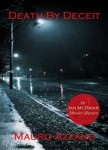

August 17 – 23: “In today’s market, does plot alone lead to sales?”
 In today’s market, does plot alone lead to sales? This week ITW Members Mauro Azzano, Barb Han and Jean Heller will discuss how age, life experiences, and a strong social media presence factor into the equation.
In today’s market, does plot alone lead to sales? This week ITW Members Mauro Azzano, Barb Han and Jean Heller will discuss how age, life experiences, and a strong social media presence factor into the equation.
~~~~~
 Mauro Azzano was born in Italy, north of Venice. He grew up in Italy, Australia and finally Canada, settling on the west coast outside Vancouver, Canada. He has a broad experience to call on as a writer, having worked as a college instructor, commercial pilot and a number of other unusual occupations. Currently, he is working on the Ian McBriar Murder Mystery series and training as a distance runner.
Mauro Azzano was born in Italy, north of Venice. He grew up in Italy, Australia and finally Canada, settling on the west coast outside Vancouver, Canada. He has a broad experience to call on as a writer, having worked as a college instructor, commercial pilot and a number of other unusual occupations. Currently, he is working on the Ian McBriar Murder Mystery series and training as a distance runner.
 Most of Jean Heller’s career was as an investigative and projects reporter and editor in New York City, Washington, D.C. and St. Petersburg Florida. Her career as a novelist began in the 1990s with the publication of the thrillers, “Maximum Impact” and “Handyman” by St. Martin’s Press. Then life intervened and postponed her new book, “The Someday File,” to publication in late 2014. Jean has won the Worth Bingham Prize, the Polk Award, and is an eight-time Pulitzer Prize nominee.
Most of Jean Heller’s career was as an investigative and projects reporter and editor in New York City, Washington, D.C. and St. Petersburg Florida. Her career as a novelist began in the 1990s with the publication of the thrillers, “Maximum Impact” and “Handyman” by St. Martin’s Press. Then life intervened and postponed her new book, “The Someday File,” to publication in late 2014. Jean has won the Worth Bingham Prize, the Polk Award, and is an eight-time Pulitzer Prize nominee.
 USA Today bestselling author Barb Han lives in Texas-her true north-with her adventurous family, a spunky golden retriever/poodle mix, and too many books (if there is such a thing). She loves romance novels, thriller movies, and cooking. Her favorite hobbies include hiking, swimming and skiing.
USA Today bestselling author Barb Han lives in Texas-her true north-with her adventurous family, a spunky golden retriever/poodle mix, and too many books (if there is such a thing). She loves romance novels, thriller movies, and cooking. Her favorite hobbies include hiking, swimming and skiing.
- LAST GIRL MISSING with K.L. Murphy - July 25, 2024
- CHILD OF DUST with Yigal Zur - July 25, 2024
- THE RAVENWOOD CONSPIRACY with Michael Siverling - July 19, 2024
